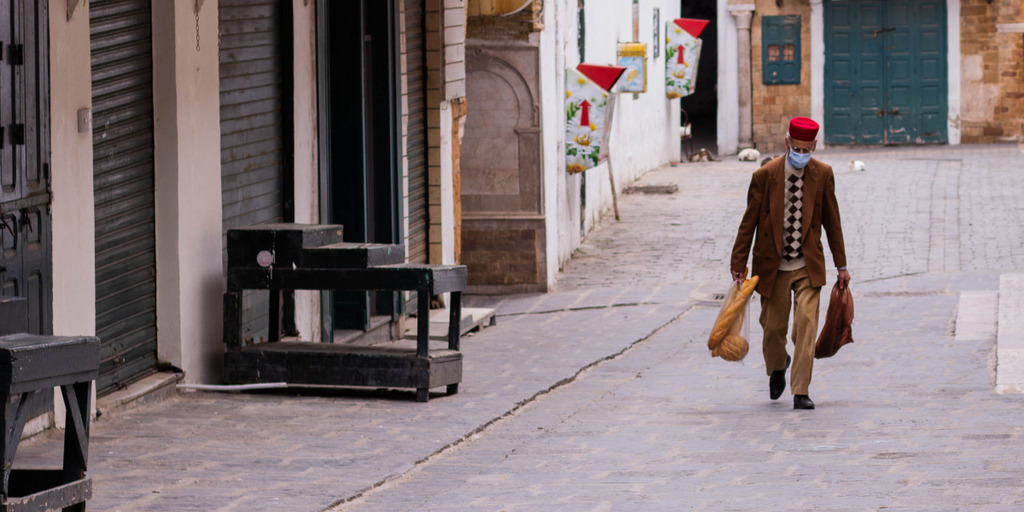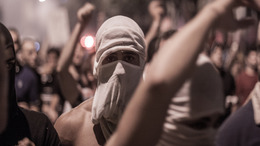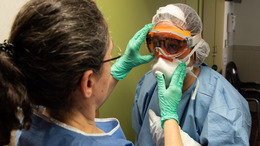At the same time, the official figures do not always reflect the real situation due to insufficient testing and the restrictive information policies enforced by some regimes. As is also true of the six countries in the EU’s Eastern Partnership (see the project report by Miriam Kosmehl), the health and social systems in the southern neighbourhood are very weak.

Brahim Guedich / Wikimedia Commons - CC BY-SA 4.0, https://creativecommons.org/licenses/by-sa/4.0/deed.en
How Europe’s southern neighbours are experiencing the corona crisis
Surprisingly, the corona pandemic has not hit the crisis- and conflict-ridden societies in the EU’s southern neighbourhood as hard as was originally feared. This may be due to the early and strict lockdown implemented by those societies, and to their relatively young populations, the high level of commitment evinced by their civil societies, and their experience dealing with crises.
Content
The collapse of the EU internal market will have consequences
It is already foreseeable that the economic and political measures taken by the West and its companies to combat the crisis and the economic slump expected in the EU’s internal market will have a considerable negative impact on the economies and social systems of neighbouring countries in the South.
The latter’s governments, businesses and civil society organizations will ask for more help from Brussels – even if the EU and its member states will be fixated on their own problems in the coming months. Yet the EU’s attention and support are needed to ensure that reforms are not jeopardized and stability is maintained.
The situation varies from country to country
The economy, politics and social structures of the ten countries in the southern neighbourhood are very heterogeneous:
- In parts of Syria and Libya, war and displacement play a decisive role.
- The EU’s relations with Morocco, Jordan, Tunisia and Lebanon are close.
- Turkey has a special position given its customs union with the EU and its being a candidate for accession to the EU.
- Egypt and Algeria are geopolitically important, but politically difficult partners.
- Israel, the most innovative economic power in the region, is linked to the EU in many ways, while the Palestinian territories are a special case.
The number of people infected with corona is a political issue
Aware that their health and social systems would not be able to cope with a corona pandemic, most of the regimes and governments in the southern neighbourhood imposed a rapid and strict lockdown for fear of conditions such as those in Iran or Italy.
The measures, however, cannot be implemented in all areas, such as in crisis zones and refugee camps, or in densely populated areas like south Beirut, east Amman or central Cairo. Some regimes have therefore played down the spread of the Covid-19 virus by adopting a restrictive information policy:
Egyptian President Abdel Fattah al-Sisi, for example, expelled an American journalist for publishing figures far in excess of those reported by the Ministry of Health. The publication of the number of infected people is a political issue, especially for powerholders of questionable legitimacy (BTI 2020).
Syria’s dictator Bashar al-Assad has every person in his territory arrested immediately who is suspected of being infected with the coronavirus. In March, his health minister announced that no one in Syria has Covid-19 because “the army is so strong.”
In Algeria (IPG), the ruling elite is also using the crisis to impose curfews with the purported goal of health protection, a move that has now “incidentally” ended the weekly peaceful mass demonstrations against the elite.
In Turkey, the government is maintaining a professional ban on prominent corona researcher Mustafa Ulasli and 15,000 other doctors, nurses and caregivers, as they are said to have supported the coup against President Recep Tayyip Erdogan in 2016.
In Tunisia, on the other hand, the new government, which has just come into office through free elections, has gained strong popular support for its pandemic measures thanks to a high degree of transparency (DAFG). Constitutional freedoms in Tunisia allow for a vibrant civil society that can absorb deficits in the health system and in the care of the needy.
Refugees are defenseless, their situation is getting worse
If the United Nations is already warning that the coronavirus could spread uncontrolled in Greece’s refugee camps (where 42,000 people are seeking protection), what does that mean for the seven million refugees and internally displaced persons in Syria (especially Idlib), Libya and eastern Lebanon who live in highly congested conditions?
Even before the corona crisis, these conflict areas lacked a minimum of health care. Médecins Sans Frontières (Guckelsberger, Zenit) is sounding an additional alarm about the danger of Covid-19 contagion in these areas, given the lack of clean water, protective clothing and medicine. In addition, curfews, newly erected checkpoints, and closed airports and roads are currently making it difficult for doctors, nurses and materials to reach the needy.
The authorities in Turkey and Jordan, on the other hand, are much better placed to care for the four million Syrians who have fled to their countries, thanks to their administrative efficiency and the technical and financial assistance they have received from Europe.
The situation is also precarious in the overcrowded prisons (Arab Reform Initiative) of various southern countries, such as Egypt, Libya and Syria. In social media, many activists and relatives have courageously demanded that rulers release political prisoners.
Significant financial, economic and social costs will follow
The curfews, collapsing international supply chains and lack of tourists are hitting the economies of Morocco, Tunisia, Egypt, Jordan and Lebanon very hard financially. Orders are being cancelled, tax revenues are falling and jobs are disappearing (ESCWA). At the same time, those in power have been under demographic pressure for years to achieve continuous growth and create millions of jobs.
Since there is no social partnership between employees and employers (Al-Ani, zenith) and no sustainable social security system in most of these countries, unemployment hits workers hard when companies cut back production due to lost orders. In addition, many workers have no savings – and impoverishment is the result.
Curfews also cause the informal sector to dry up (UNDP), affecting at least 50% of the working population. Particularly in the small business sector, many members of the lower middle class earn money through second and third jobs, which they need to keep themselves and their families afloat.
Many harvest workers are also not being paid: Due to the corona-related travel ban, hundreds of thousands of Moroccans and Tunisians cannot work as seasonal labor on farms in Spain and Italy.
Reduced money transfers are also a growing problem. Millions of Moroccans, Algerians and Tunisians depend on remittances from their relatives in Spain, Italy and France. However, the crisis is hitting these three EU member states particularly hard. In a recession, migrants quickly lose their jobs and remittances to relatives in North Africa decline.
Morocco and Tunisia are closely linked to the European Economic Area through sizeable import and export flows, as are Jordan and Turkey. Many labor-intensive supplier companies are located in these four southern countries and are now suffering from production losses due to the collapse of the EU’s internal market. European companies are very likely to accelerate the automation and digitalization of their production lines as a result of the corona crisis, which means they may also reduce the size of their trans-Mediterranean supply chains. Morocco, Tunisia, Jordan and Turkey would lose important jobs and tax revenues as a result.
Few governments have the financial resources to shoulder these immense economic losses and to implement large-scale financial bailouts to save domestic businesses. Morocco signaled its ability to act by setting up its own €1 billion aid package for needy companies – backed by over €500 million in emergency financial aid from the EU.
Lebanon is already insolvent. Will others follow?
In general, however, the Arab southern neighbours have hardly any budget reserves, since their national debt ratio has been too high for years. Lebanon, for example, has already declared insolvency and Tunisia has to raise 25% of its annual budget for debt service. Many Arab countries are already asking the international financial institutions (IFIs) for budget support or loan deferrals.
In addition to Morocco, the European Union already transferred an emergency financial grant to Tunisia and Jordan in March. In addition, the European Commission, together with the European Investment Bank (EIB) and the European Bank for Reconstruction and Development (EBRD), is launching a macro-financial assistance package (EU-COM) as part of a package of grants, loans and credits on favorable terms, from which Jordan and Tunisia are the first southern neighbours to benefit.
These are not “fresh European funds,” however, but reallocations or allocations from unused budgets. Even if the financial subsidies help to plug short-term budget holes, European politicians should also seize the opportunity, in a spirit of solidarity with their partner governments in the South, to use the financial support in such a way as to push ahead with reform projects that have fallen behind. This would better prevent economic and social systems from becoming vulnerable to risks in the future and strengthen the rule of law and good governance by the authorities.
The Turkish government will also make its views known: The ailing Turkish economy and the expected losses in the tourism industry will lead President Erdogan to make far greater financial demands on Brussels and Berlin to reduce his costs for refugee care.
Israel is better equipped. But what about the Palestinians?
Due to its innovative economic power, Israel is in a position to overcome the crisis better than many Arab and European neighbours. In Israeli society, there are few reservations about using digitization for the identification and control of people infected with the coronavirus. However, the Netanyahu government is concerned that the social and political situation in the Palestinian territories will continue to deteriorate.
Israel’s ministries are trying to prevent this by means of practical cooperation with the Palestinian authorities (INSS). The two million Palestinians in the Gaza Strip are particularly defenseless due to the extremely dense conditions there, the blockade of the area by Israel and Egypt and the incapable Hamas government.
Corona overshadows the wars and crises only for the moment
The existing political conflicts and wars in the EU’s immediate southern neighbourhood are getting less attention due to the corona crisis, but have retained their explosive power (Clingendael Institute).
Although military attacks in northern Syria have been suspended, a conquest of Idlib province with its three million inhabitants and refugees remains high on the agenda of Assad and Russian President Vladimir Putin.
The pandemic is therefore only giving a breathing space to those who are already suffering, before, in all likelihood, air raids on hospitals, schools and bakeries begin again.
In the Syrian-Kurdish area of Afrin, which is occupied by the Turkish military, a single terrorist attack on April 29 killed almost 50 people. Although it is still unclear who was responsible for the attack, it could conceivably be related to the many demands made by Kurds for autonomy or even statehood.
Haftar is instrumentalizing the pandemic in Libya
In the Libyan war zone, on the other hand, facts are being created in the shadow of the corona crisis (Keilberth, zenith): Forces led by General Khalifa Haftar, who is not internationally recognized but who is supported by important states (United Arab Emirates, Egypt, Russia), have been advancing to Tripoli, the capital, to overthrow the internationally recognized government (backed by Turkey) based there. General Haftar and his supporters are thus counteracting Germany’s role as mediator in the Libyan civil war, one mandated by the EU.
As a result of the European “Irini” mission (EEAS), the enforcement of the arms embargo via the Mediterranean is slowly getting underway – but one of the decisive factors for an effective embargo is preventing weapons from reaching the warring parties by land or air.
In various conflict zones in the EU’s immediate southern neighbourhood, the Emirates and Saudi Arabia have been playing out their political and ideological antagonism towards Iran for years. This rivalry is further complicated by Iran’s confrontation with the US and Israel.
De-escalation mechanisms around the Gulf region can contribute considerably to easing the various conflicts taking place in the south-eastern Mediterranean part of the EU’s southern neighbourhood.
The Covid-19 pandemic has hit Iran particularly hard (offiziere.ch), so that even Arab opponents in the Gulf are concerned about the country’s further destabilization. Surprisingly, the Emirates have flown relief supplies to Tehran, even though that puts them in breach of the strict Iran sanctions imposed by US President Donald Trump, which they themselves have been enforcing. There is a chance that humanitarian and economic interests inherent to the corona crisis will help minimize political conflicts in the Gulf region (Hilterman, Carnegie).
Additional burdens and consequences of low oil prices
In addition to the corona pandemic, the neighbourhood has also been affected by the price of oil, which has been at a low for months, and by the fact that oil exporters – such as the wealthy Gulf States (GCC), Algeria and Iran (which, despite the sanctions, depends on revenues from oil exports) – must now reckon with lower export revenues. Certainly, the GCC countries and Algeria can draw on reserves, but Saudi Arabia’s decision to drastically increase its VAT, to give one example, shows that fewer funds will be available for foreign activities in the future. This would affect financial contributions to the EU’s Arab neighbours, such as Morocco, Tunisia, Jordan, Lebanon and the Palestinians. Iran has already cut funding to allied militias in Lebanon and Syria. Smaller budgets for parties involved in wars and conflicts could conceivably lead to de-escalation processes.
Who organizes stability in the EU’s neighbourhood?
These three examples of war and conflict (Libya, Syria, the Gulf region) illustrate that, in addition to managing the corona crisis, more political and diplomatic energy would have to be mobilized by the European Union and its member states to promote stability in the neighbourhood.
Brussels must not leave this stabilization to Russia, Turkey, Iran, Saudi Arabia, the US or China alone. After all, these powers usually pursue other interests in the Middle East than European politicians do. Brussels is propagating a stability in its neighbourhood that is meant to help the countries there transform towards participation, the rule of law and a social market economy – based on European values.






